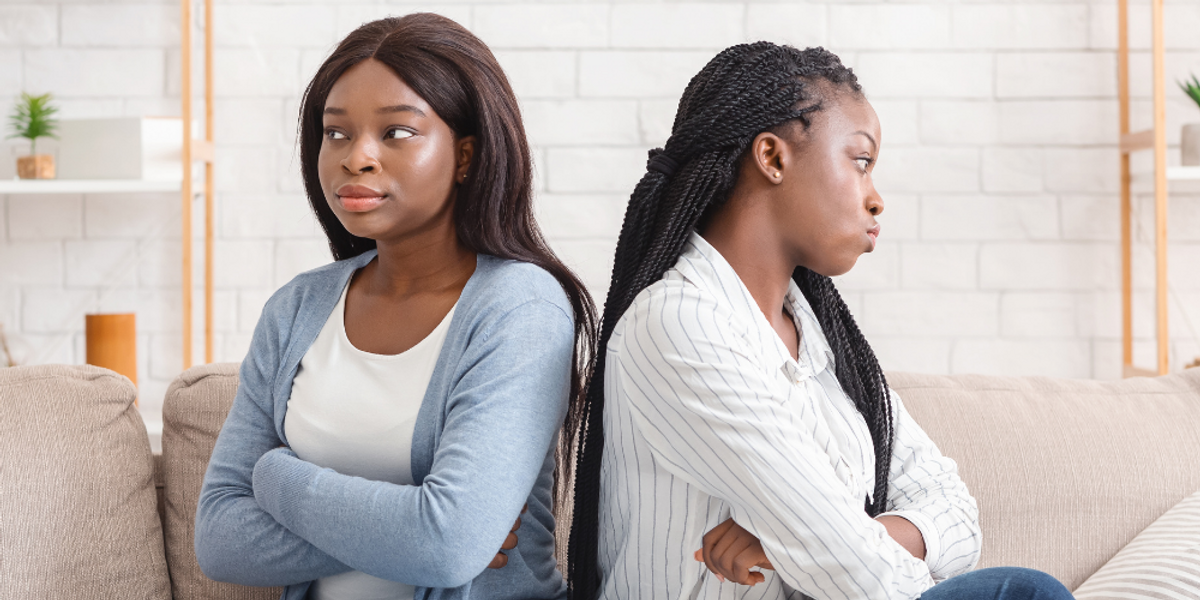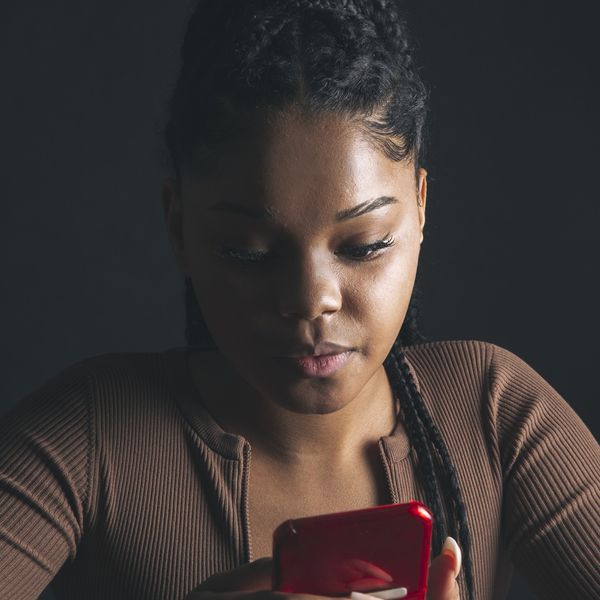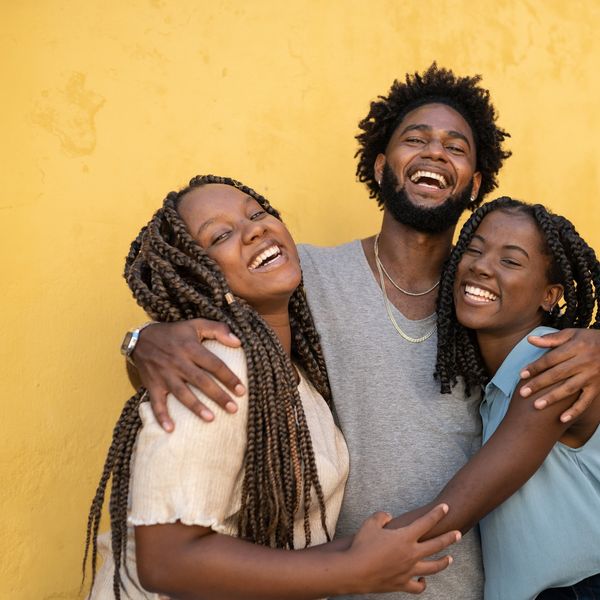
Are You In A Codependent Friendship? Here Are Some Of The Signs
Toni Childs and Joan Clayton were more than friendship goals. They were life. I was in middle school when Girlfriends first came on the air, and in college when it ended. Growing up watching their epic friendship, it only made sense to want to have a friend like that. But when Girlfriends made its comeback on Netflix, I couldn't help but cringe at their relationship during my binge sessions. Toni's colorist remarks and Joan's self-righteous attitude were just the tips of the iceberg. They couldn't do life without each other. They were one another's soulmates. But their lives didn't complement one another. Instead, their codependency proved to be toxic to the point they would cross so many disrespectful lines, break-up, only to come back to each other again... until they didn't.
Suffice to say, it's so easy to find ourselves giving our lives to relationships. They're your person and we all need one of those. But over time, little and big things could add up to a codependent friendship that is beyond unhealthy, full of manipulation and guilt-tripping (even if it's subconscious). We all love our friends, but this type of attachment just isn't healthy. Here are the signs you could be in a codependent friendship.
1.You're A Fixer

Tumbler
One sign that you are in a codependent friendship is that you spend your energy trying to fix and solve your friend's problems, sometimes letting your own go unnoticed. You're always the first (and often the only) person they call to come and save them, knowing you'll drop everything and show up for them. You feel like you're the only person who can be there for your friend, and they let you because that's all they know.
2.You Feel Anxious If You Don’t Talk To Them

Giphy
You tend to go beyond giving your friend a side-eye if you haven't talked to them in a while. In a codependent friendship, you can't function if days go by and you haven't spoken. You feel like you need to talk to them so they can guide you through your daily life.
3.You’re Selfless To A Fault

Giphy
You find yourself sacrificing and putting your friend first with nothing in return. You rarely prioritize yourself because you're afraid you could come across as selfish. They might even say things to make you feel that way. In return, your own needs sit unmet on the back-burner.
4.You’re Jealous If They Hang Out With Other Friends

Giphy
Especially without you. You know you're their best friend, and you believe they shouldn't have their own circle outside of your relationship with them. You find yourself getting envious and feeling threatened if they get too close with another person rather than developing a community of your own.
5.You Feel Drained

Giphy
If you're honest, in a codependent friendship, you feel drained after spending time with them. Whether it's one always calling to use the other as a soundboard for their problems (big and small) or being extremely needy and clingy, making you feel guilty for having a life outside of them. You pour your life and energy into the other person, hardly ever filling your own tank.
6.Your Identity Is Tied To Them

Giphy
In codependent friendships, you don't know who are you without them or when they're not around. Your self-worth, value, and identity are connected to your friendship with them. Yes, it feeds you, but you might feel like you're starving if they're not by your side.
7.You Can’t Make Decisions Without Them

Giphy
There's a difference between wanting to share life moments with a friend, and feeling like you need their "OK" or permission to make those moments. Another sign of a codependent friendship is that you feel like you can't make any major decision without them. Taking a new job (especially in another city), dating a new guy, or going back to school has to go through their checklist of approval.
Are you a member of our insiders squad? Join us in the xoTribe Members Community today!
Feature Image By Shutterstock
- The Self-Care Of Ghosting Toxic Girlfriends - xoNecole: Women's ... ›
- 10 Things To Expect From Your Friendships - xoNecole: Women's ... ›
- Subtle Signs Your Friend Doesn't Like You - xoNecole: Women's ... ›
- 6 Signs A New "Friend" Is Nothing But An Opportunist ›
Charmaine Patterson is a journalist, lifestyle blogger, and a lover of all things pop culture. While she has much experience in covering top entertainment news stories, she aims to share her everyday life experiences, old and new, with other women who can relate, laugh, and love along with her. Follow Char on Twitter @charjpatterson, Instagram @charpatterson, and keep up with her journey at CharJPatterson.com .
This article is sponsored by Hulu.
UnPrisonedhas returned for its highly anticipated second season, delving deeper into the complex dynamics of the Alexander family.
The series premiere comes a year after its debut season garnered rave reviews from fans and critics and earned record-breaking ratings for Hulu's Onyx Collective brand. UnPrisoned's success can be attributed to its raw, relatable themes and comedic appeal.
Inspired by creator Tracy McMillan's life, the show follows Paige (Kerry Washington), a therapist and single mother whose life takes an unexpected turn when her father, Edwin (Delroy Lindo) --who was released from prison-- moves in with her and her teenage son, Finn (Faly Rakotohavana).
Throughout UnPrisoned's first season, viewers witnessed how Edwin's incarceration deeply affected Paige's life and relationships. In the series, Paige unpacks her trauma through interactions with her inner child and her online followers. Meanwhile, Edwin is overcoming specific struggles with his own past that led to his life of crime, including a dysfunctional upbringing and his mother's arrest. As the Alexanders attempt to reconcile, new challenges arise.
This new season promises to further explore their unconventional family dynamic. Here are several compelling reasons why season two of UnPrisoned should be on everyone's watchlist.
The Alexander Family Life Is Still In Shambles
UnPrisoned's second season resumes where the series left off, with Paige grappling with the fallout from her troubled therapy practice and Edwin navigating life independently after moving out. Meanwhile, Finn faces his own challenges. The teenager is battling anxiety and seeking information about his father—a topic Paige avoids discussing.
The Alexander Family Are Attending Therapy To Resolve Their Underlying Issues
Amid the chaos in their lives, the Alexander family decides to mend their bond by confronting their past traumas. They seek professional help and attend therapy sessions with a “family radical healing coach,” played by John Stamos, a new cast member. This collective effort aims to unravel the complexities of their shared history and strengthen their relationships.
The process of unraveling each character's internal conflicts and their potential impact on future relationships may clash with Paige's textbook therapy approach. While Paige is used to being in the therapist's seat in both career and family, this forces her into the unfamiliar role of a patient during therapy sessions. This shift would compel her to look in the mirror and try a radically different approach.
The Alexander Family Learned A Big Lesson During A Therapy Session
In therapy, the Alexanders are tasked with addressing their individual traumas to salvage their remaining relationships. One of the family therapist’s eccentric suggestions was an exercise involving a family wrestling match. During this session, Paige faces tough questions about her refusal to share information about Finn's father.
While it's unclear whether this scene is reality or fantasy, the image of the family duking it out in the ring certainly makes for hilarious yet compelling television.
Paige Tries Dating Again Following Failed Relationships
Amid her life's chaos, Paige decides to step back into the dating field. However, her many attempts have left her with mixed results. The dating apps have turned out to be a fail, and an outing with her ex Mal (Marque Richardson), who is also her father's parole officer, doesn’t go quite as expected after he brings an unexpected guest – his new girlfriend.
The situation takes an awkward turn when Mal's new partner learns why the former couple split, partly due to Paige's self-sabotage.
UnPrisoned Is A Perfect Balance Of Comedy And Drama
As a dramedy, UnPrisoned takes a comedic approach to its heavy subjects. The show takes us on a ride with Paige's dating misadventures and navigating a friendship with her ex.
Other lighthearted moments include Edwin's attempts at CPR based on online videos and, of course, the antics of the Alexander family's unconventional new healing coach.
The second season of UnPrisoned is now available on Hulu.
UnPrisoned | Season 2 Trailer | Hulu
Feature image courtesy
'Love Island USA' Star JaNa Craig On The Reality Of Black Women On Dating Shows
Love Island USA just wrapped up its sixth season, and it has been the talk of the town. According to Nielsen, it's the No. 1 show on streaming, proving it's just as entertaining as the UK version. One of the reasons this season has been successful is due to the authentic relationships formed between the islanders in the villa.
You have the sisterhood between Serena Page, JaNa Craig, and Leah Kateb, aka PPG, and the real relationship moments between couples like Serena Page and Kordell Beckham, who were named the winners of this season. The other finalists include Leah Kateb and Miguel Harichi, Nicole Jacky and Kendall Washington, and JaNa Craig and Kenny Rodriguez.
While JaNa made it to the finale with her boo Kenny, her journey in the villa was far from perfect. Viewers saw the Las Vegas native get her heart stomped on a few times after many of her connections didn't work out.
At one point, it even looked like she was getting kicked off the island. While she had a lot of support from people watching the show, it was clear that she was in a position that many Black women on reality dating shows find themselves in: not being desired.
It has been an ongoing conversation among Black women watching reality dating shows as we see time and time again that non-Black women or racially ambiguous-looking women are often chosen over Black women, especially dark-skinned women. In a discussion with Shadow and Act, JaNa opened up about the support she received from viewers.
@cineaxries i love them 🤧 #janacraig #janaandkenny #loveislandusa #foryou #peacock #loveisland #janaloveisland #xybca #kennyloveisland #janaedit #loveislandedit #janaedits #loveislandusaedit #viral #loveislandusaseason6 #foryoupage #peacocktv
"You know what’s so crazy? I’m so grateful, because when I got my phone, the way they’re making us The Princess and The Frog…I felt honored. I will be that beautiful chocolate queen if I need to be. And the comments like 'beautiful chocolate girl,' I’m like, all Black women are beautiful. There’s the whole light skin versus dark skin, which breaks my heart. I just really don’t understand that, but I will take pride and represent us well," she said.
She also candidly discussed her experience as a dark-skinned Black woman on the show. JaNa and Serena had been in the villa since the first episode, and they were the only dark-skinned Black women there. As new men aka bombshells came into the villa, they found themselves not being wanted by many of them.
"Me and Serena literally had a heart-to-heart before Kenny came in and she’s like, I just don’t think it’s fair that the Black girls don’t get enough fair chance.' Every islander that came in, we were not their top pick. And we just [thought], maybe because we’re Black girls, and the dark-skinned Black girls. It sucked," she said.
"I’m like, 'Serena, we know what we bring to the table. We’re great personalities. A guy’s going to come in for us.' That’s when we manifested what we wanted, and that’s when I manifested Kenny."
@ashleyvera__ We love to see it 🥰 #loveislandusa #loveisland #loveisland2024 #janaandkenny #loveislandseason6 #peacock #realitytv #fypage
After many failed connections, Kenny came in and immediately turned JaNa's experience around. America watched the model get the care and attention that she deserved.
"I’m not going to hold you. When I was in the bottom for a quick second, I’m like, ‘There’s no way America doesn’t [ride for us]. I know Black America had to ride for me, but maybe because I’m a dark-skinned … hmm … maybe … you feel me? And you saw the Casa Amor lineup. Beautiful, beautiful light-skinned [women]," she said.
"We looked at each other like, 'Damn, Love Island did their big one with this. And every single Casa Amor girl was like, 'You girls are gorgeous, you guys are stunning.' They expressed love. You guys are beautiful and it felt good."
Although she and Kenny came in third place, JaNa is happy that she got her man in the end. "I think the thing I’m most grateful about is the fact that this is a beautiful love story like you guys complement each other and there’s no hate toward the skin color. It’s all love and support. I love that more than anything," she said.
"That’s why I was like, 'I won,' even though I didn’t win. And the fact that Serena won, we were like, 'Yeah, run that.' Either way, we won. And I love the support from all communities."









